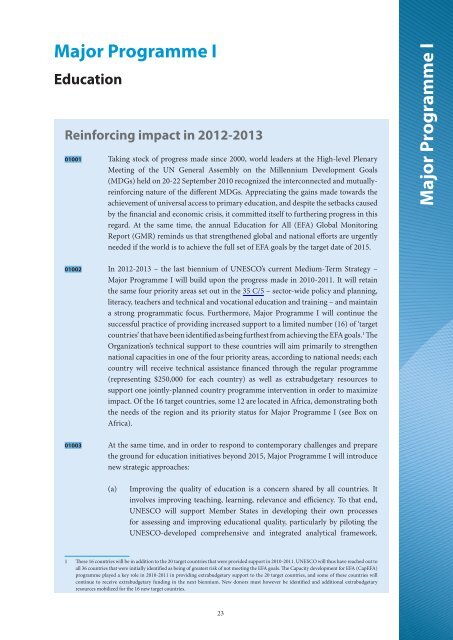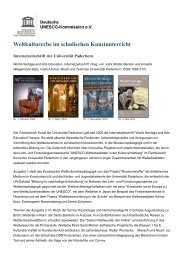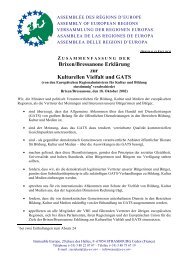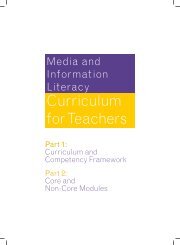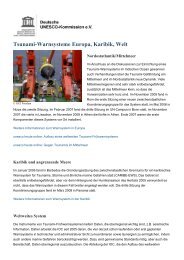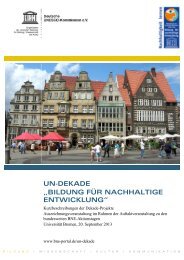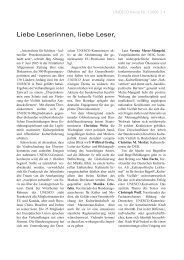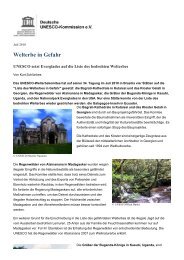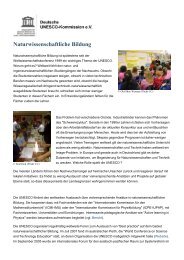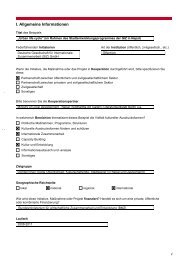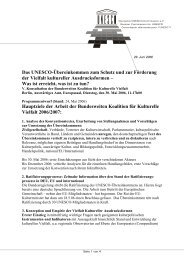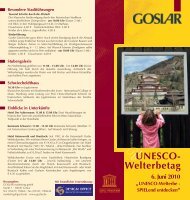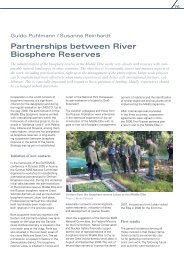- Page 1 and 2:
36 C/5 2012-2013 DRAFT RESOLUTIONS
- Page 3 and 4:
Published in 2011 by the United Nat
- Page 5 and 6:
Introduction by the Director-Genera
- Page 7 and 8:
important ways, on the work to be u
- Page 9 and 10:
Let me emphasize, however, that bey
- Page 11 and 12:
Let me add a few words on the struc
- Page 13 and 14:
Board on the IEE - and we have prov
- Page 15 and 16:
do so with excellence, dedication a
- Page 17 and 18:
Draft Appropriation Resolution for
- Page 19 and 20:
Assessment (i) The appropriations a
- Page 21 and 22:
General Policy and Direction 00100
- Page 23 and 24:
Programmes 01000 Draft resolution f
- Page 25 and 26:
MLA 4: Reinforcing leadership for E
- Page 27 and 28:
4. Expresses its gratitude to the S
- Page 29 and 30:
01300 UNESCO Institute for Lifelong
- Page 31 and 32:
01400 UNESCO Institute for Informat
- Page 33 and 34:
their respective missions, the prio
- Page 35 and 36:
02000 Draft resolution for Major Pr
- Page 37 and 38:
Main line of action 2: Building cap
- Page 39 and 40:
02100 Draft resolution for the UNES
- Page 41 and 42:
02200 Draft resolution for the Abdu
- Page 43 and 44:
03000 Draft resolution for Major Pr
- Page 45 and 46:
Science Council, notably in connect
- Page 47 and 48:
04000 Draft resolution for Major pr
- Page 49 and 50:
(xviii) promote tourism as a vector
- Page 51 and 52:
05000 Draft resolution for Major Pr
- Page 53 and 54:
(b) to report periodically to the g
- Page 55 and 56:
3. Invites Member States, internati
- Page 57 and 58:
8. Further requests the Director-Ge
- Page 59 and 60:
situations, in close coordination w
- Page 61 and 62:
(ix) strengthen the role of the Afr
- Page 63 and 64: (xiii) monitor gender balance in th
- Page 65 and 66: (viii) promote the integration of a
- Page 67 and 68: 09500 Draft resolution for External
- Page 69 and 70: • establishing a modernized and i
- Page 71 and 72: Participation Programme and Fellows
- Page 73 and 74: a regional project or activity. The
- Page 75 and 76: (ii) multilateral emergency assista
- Page 77 and 78: 10200 Draft resolution for the Fell
- Page 79 and 80: (vi) administrative actions relatin
- Page 81 and 82: 13000 Draft resolution for Support
- Page 83 and 84: Paris 2011 Volume 2 - DRAFT PROGRAM
- Page 85 and 86: Published in 2011 by the United Nat
- Page 87 and 88: Paragraph II.C - Participation Prog
- Page 89 and 90: the UN General Assembly’s High-Le
- Page 91 and 92: document highlights linkages of the
- Page 93 and 94: financial and economic crisis and r
- Page 95 and 96: ▪ In order to reinforce our relat
- Page 97 and 98: I wish to assure Member States that
- Page 99 and 100: Summary by Sector/Unit of regular p
- Page 101 and 102: Part 1 - 2 ESTABLISHED POSTS BY CAT
- Page 103 and 104: I.A - Governing bodies The presenta
- Page 105 and 106: 00402 IOS’s strategic approach an
- Page 107 and 108: 00503 Expected results at the end o
- Page 109 and 110: Under the responsibility of IOS:
- Page 111 and 112: MP I Education
- Page 113: ED 2 Implementing Region / Headquar
- Page 117 and 118: 01007 With these concerns in mind,
- Page 119 and 120: Category 2 centres 01013 The Educat
- Page 121 and 122: 01020 As we approach the target yea
- Page 123 and 124: 01025 This work will be implemented
- Page 125 and 126: Teachers 01029 Good teachers are th
- Page 127 and 128: meetings to be better informed. Ski
- Page 129 and 130: Expected result 5: Capacities in Me
- Page 131 and 132: to regional higher education reform
- Page 133 and 134: and South-South cooperation. This w
- Page 135 and 136: Performance indicators ▪ Percenta
- Page 137 and 138: Expected result 10: Education for g
- Page 139 and 140: Global advocacy and partnerships to
- Page 141 and 142: Personnel and the 2001 Revised Reco
- Page 143 and 144: UNESCO Category 1 institutes in edu
- Page 145 and 146: MLA 3 - expected result 8: Capaciti
- Page 147 and 148: (ii) (iii) target on-the-ground sup
- Page 149 and 150: UNESCO Institute for Lifelong Learn
- Page 151 and 152: MLA 4 - expected result 13: Impleme
- Page 153 and 154: 01405 Expected results at the end o
- Page 155 and 156: Performance Indicators ▪ Number o
- Page 157 and 158: (iii) promote inter-regional cooper
- Page 159 and 160: MP II Natural sciences
- Page 161 and 162: SC 2 Decentralization of budget and
- Page 163 and 164: which cuts across all divisions, an
- Page 165 and 166:
other UN agencies in the context of
- Page 167 and 168:
02018 UNCED and WSSD emphasized the
- Page 169 and 170:
Expected results at the end of the
- Page 171 and 172:
02034 Gender will be further mainst
- Page 173 and 174:
Expected result 1: Strengthened and
- Page 175 and 176:
02042 Many countries face a shortag
- Page 177 and 178:
02046 Reflecting the global trend t
- Page 179 and 180:
02049 In line with the UNESCO manda
- Page 181 and 182:
Expected result 12: Member States
- Page 183 and 184:
(ISARM) - will play an important ro
- Page 185 and 186:
02059 A significant increase in the
- Page 187 and 188:
einforced through international par
- Page 189 and 190:
02065 UNESCO now has an operational
- Page 191 and 192:
Performance Indicators ▪ Disaster
- Page 193 and 194:
Conflict Management and with ICHARM
- Page 195 and 196:
02206 ICTP shares common interests
- Page 197 and 198:
MP III Social and human sciences
- Page 199 and 200:
SHS 2 Decentralization of budget an
- Page 201 and 202:
03003 Contemporary societies are un
- Page 203 and 204:
in the face of contemporary challen
- Page 205 and 206:
through the Interagency Committee o
- Page 207 and 208:
Expected result 2: Policies develop
- Page 209 and 210:
new mechanism for human rights main
- Page 211 and 212:
Expected result 6: Social change co
- Page 213 and 214:
and regional levels on government i
- Page 215 and 216:
Expected result 10: Increased recog
- Page 217 and 218:
MP IV Culture
- Page 219 and 220:
CLT 2 Decentralization of budget an
- Page 221 and 222:
its heart, Headquarters will concen
- Page 223 and 224:
cultural diversity, intercultural d
- Page 225 and 226:
of concrete actions on the ground.
- Page 227 and 228:
Global Priority Gender Equality 040
- Page 229 and 230:
urbanization and climate change so
- Page 231 and 232:
Main line of action 2: Enhancing th
- Page 233 and 234:
Expected result 6: The 1970 Convent
- Page 235 and 236:
Performance indicators ▪ Effectiv
- Page 237 and 238:
Performance indicators ▪ Develop
- Page 239 and 240:
04075 The new Global Partnership fo
- Page 241 and 242:
Expected result 16: Social, economi
- Page 243 and 244:
Performance indicators ▪ Integrat
- Page 245 and 246:
MP V Communication and information
- Page 247 and 248:
CI 2 Decentralization of budget and
- Page 249 and 250:
prerequisite for development effect
- Page 251 and 252:
05013 The human-rights based approa
- Page 253 and 254:
05022 The Programme builds on the r
- Page 255 and 256:
05030 UNESCO will assist Member Sta
- Page 257 and 258:
05040 Technical assistance and capa
- Page 259 and 260:
Expected result 2: The role of medi
- Page 261 and 262:
eport on science issues. Emphasis w
- Page 263 and 264:
Biennial Sectoral Priority 2: Foste
- Page 265 and 266:
Performance indicators ▪ Increase
- Page 267 and 268:
UNESCO Institute for Statistics (UI
- Page 269 and 270:
06006 The UIS will address the risi
- Page 271 and 272:
Expected result 3: Capacities of na
- Page 273 and 274:
comparable data. The UIS will defin
- Page 275 and 276:
Expected result 10: Data on ICT in
- Page 277 and 278:
Expected result 14: The quality of
- Page 279 and 280:
process will be designed to ensure
- Page 281 and 282:
implies that women and men have equ
- Page 283 and 284:
07026 The Director-General proposes
- Page 285 and 286:
- Member States will be assisted in
- Page 287 and 288:
(iii) (iv) (v) (vi) (vii) a new Pro
- Page 289 and 290:
Environment conducive to social int
- Page 291 and 292:
including gender equality issues, r
- Page 293 and 294:
Intersectoral Platform on UNESCO’
- Page 295 and 296:
07055 Expected results at the end o
- Page 297 and 298:
07063 Results expected at the end o
- Page 299 and 300:
Field - 2 Items of Expenditure Acti
- Page 301 and 302:
of Humanitarian Affairs (OCHA) Cons
- Page 303 and 304:
Part II.B - 2 ESTABLISHED POSTS BY
- Page 305 and 306:
Chapter 1 - Coordination and monito
- Page 307 and 308:
promote intersectoral projects such
- Page 309 and 310:
Expected result 2: Intersectoral co
- Page 311 and 312:
▪ Provide issue and demand-driven
- Page 313 and 314:
New partnerships with various stake
- Page 315 and 316:
extrabudgetary programmes. In this
- Page 317 and 318:
Chapter 5 - External relations and
- Page 319 and 320:
09510 Expected results at the end o
- Page 321 and 322:
world reports. The UNESCO Secretari
- Page 323 and 324:
UNESCO’s leaders and experts; by
- Page 325 and 326:
II.C - Participation Programme and
- Page 327 and 328:
Chapter 1 - Participation Programme
- Page 329 and 330:
Part III - Corporate Services Part
- Page 331 and 332:
Part III - 2 Corporate Services EST
- Page 333 and 334:
Items of Expenditure Activities Reg
- Page 335 and 336:
insurance; briefing and counselling
- Page 337 and 338:
III.B - Financial management 12001
- Page 339 and 340:
III.C - Support services management
- Page 341 and 342:
13302 The division provides operati
- Page 343 and 344:
Headquarters. Full implementation o
- Page 345 and 346:
Part IV - Loan Repayments for the R
- Page 347 and 348:
36 TECHNICAL NOTE AND ANNEXES 2012-
- Page 349 and 350:
Published in 2011 by the United Nat
- Page 351 and 352:
Technical note and budgeting method
- Page 353 and 354:
Table 1 - Variation between the Dra
- Page 355 and 356:
T007 With regards to the Field Netw
- Page 357 and 358:
are summarized in the relevant chap
- Page 359 and 360:
are now regrouped in a separate app
- Page 361 and 362:
Table 2 - Summary of the Comparativ
- Page 363 and 364:
T013 Price increases for goods and
- Page 365 and 366:
Anticipated cost increases for 2012
- Page 367 and 368:
Table 5 - Recosting and Real Reinfo
- Page 369 and 370:
Annex I - Budget summary by main li
- Page 371 and 372:
PART Field office implementation of
- Page 373 and 374:
Sector/Unit Posts in the profession
- Page 375 and 376:
Annex III - Summary of established
- Page 377 and 378:
DG DDG ADG Director Professional an
- Page 379 and 380:
Annex IV - Summary of decentralizat
- Page 381 and 382:
Major Programme / Main line of acti
- Page 383 and 384:
Major Programme / Main line of acti
- Page 385 and 386:
Table 2 - Regular budget establishe
- Page 387 and 388:
Annex VI - Regular budget summary b
- Page 389 and 390:
Annex VII - Summary of extrabudgeta
- Page 391 and 392:
PART Africa Arab States Asia and th
- Page 393 and 394:
(b) Headquarters Utilization Fund I
- Page 395 and 396:
(d) Publications, Auditory and Visu
- Page 397 and 398:
(f) UNESCO Staff Savings and Loan S
- Page 399:
Director-General Draft 36 C/5 Organ


